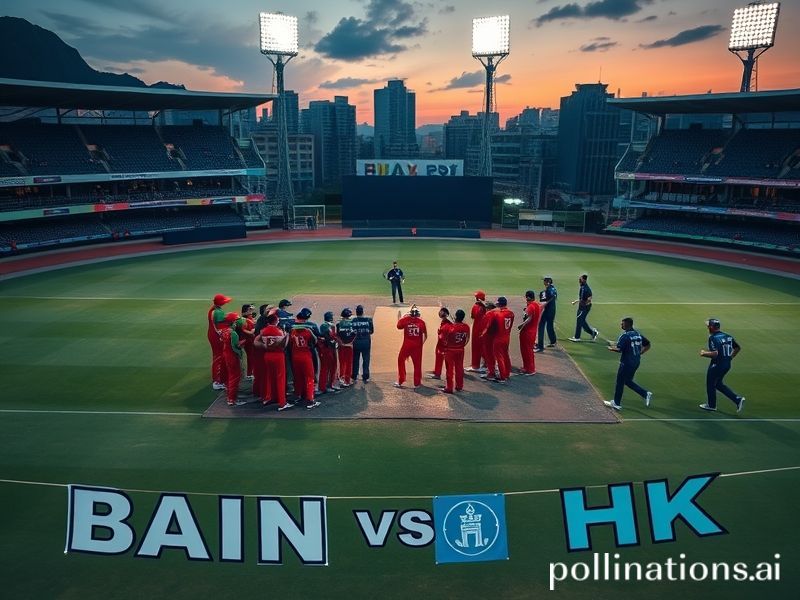Global Game of Ban vs HK: When Policy Metropolis and Everyone Lost Wi-Fi
Ban vs HK: When Bureaucracy Met a City-State and Nobody Won
By Dave’s Correspondent-at-Large, nursing a lukewarm espresso in a city that still pretends it’s 1997
The world woke up this week to discover that “Ban” is no longer just what you do to plastic straws, social media trolls, or that cousin who insists on karaoke at 2 a.m. Ban—let’s call it the Abstract Regulatory Blob—has now squared off against Hong Kong, the planet’s favorite neon-lit metaphor for everything from laissez-faire fantasy to authoritarian cautionary tale. The match-up, hashtagged #BanVsHK, is less Rocky IV and more Godzilla vs. a very polite vending machine: loud, oddly choreographed, and destined to sell a lot of popcorn to onlookers who swear they’re only here for the cultural significance.
Let us zoom out. From Berlin to Bogotá, governments are locked in a perpetual game of “Whose Sovereignty Is It Anyway?” Every few months they roll the geopolitical dice and land on “Restrict Something Symbolic.” Banning TikTok, banning Russian cats, banning the export of certain semiconductor wavelengths that 0.003 % of humanity can even pronounce—these are the new Olympic sports. Hong Kong, meanwhile, has spent decades perfecting the art of being simultaneously everywhere and nowhere: a city that sells you a Rolex, a tailor-made suit, and a lecture on rule of law before lunch, then vanishes into the humid haze like a mirage that read too much Milton Friedman.
Enter Ban. Nobody is quite sure where Ban came from. Some say it gestated in a subcommittee on subcommittees; others insist it was crowd-sourced from the comments section of a World Economic Forum livestream. What we do know is that Ban decreed Hong Kong must no longer do The Thing—capital T, capital F. The Thing might be importing a particular chip, exporting a particular protest anthem, or merely existing in its current tax-bracketed form. The details shift depending on which bureaucrat last updated the PDF. The result is a slow-motion collision between an omnidirectional policy and a city that has historically treated rules the way a sushi chef treats fish: observe, slice, serve with wasabi.
Global implications? Oh, they’re scrumptious. In Brussels, officials now have a fresh excuse to extend lunch by 45 minutes—“monitoring the Ban-HK situation,” they murmur, reaching for the Chablis. Wall Street quants have built a volatility index that spikes whenever someone in Admiralty coughs. Singapore, ever the diligent understudy, has started rehearsing lines like “We, too, could be banned any minute—please move your regional HQ here just in case.” Meanwhile, crypto bros in Lisbon are minting an NFT collection titled “BANNED IN HK,” each token a pixelated rendering of a tear-gas canister wearing a VR headset. Bids start at 3.5 Ethereum, or roughly the cost of one Hong Kong parking space per hour.
Human nature, ever the reliable punchline, has responded with creative cowardice. Multinationals are redrawing supply-chain flowcharts to resemble abstract art: arrows that loop through the Cayman Islands, dodge a tariff in Jakarta, and somehow terminate in a warehouse outside Reno labeled “Definitely Not Hong Kong.” Journalists have revived the Cold War tradition of using phrases like “sources familiar with the thinking of people who once read a briefing paper,” which is shorthand for “we asked ChatGPT and crossed our fingers.”
And yet, beneath the slapstick lies a darker punchline. Every time Ban expands its waistline, another city learns the lesson: sovereignty is negotiable, liquidity is sacred, and dignity is an optional extra—like heated seats. What’s being tested isn’t merely Hong Kong’s ability to route around prohibition; it’s the entire post-1945 assumption that economic openness and political autonomy can share a bunk bed without one wetting the mattress.
So place your bets, dear readers. Will Ban flatten Hong Kong into a generic mainland port with better dim sum? Will Hong Kong absorb Ban, repackage it as a financial derivative, and sell it back at 300 % markup? Or will both collapse into a quantum singularity of red tape, leaving only a QR code that links to a 404 page titled “Error: Jurisdiction Not Found”?
My money’s on the vending machine. At least it gives change.







